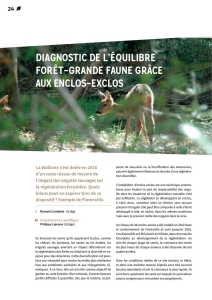Wild ungulates strongly affect forest regeneration and can alter forest species composition and functioning. Their impact is difficult to measure since forest regeneration is also affected by a multitude of other factors such as light, soil characteristics or competition between species in close interaction and difficult to quantify. Enclosures-exclosures experiments allow isolating the effect of ungulates from other factors. Vegetation changes can be observed without ungulate impact (in enclosures) and compared to vegetation changes in natural conditions (exclosures). Forty-eight enclosures-exclosures pairs where monitored during 4 years in a beech forest of southern Belgium. They were installed in small forest gaps favorable for seedlings and sapling development. Beech and spruce Saplings were the most abundant in the two compartments. Growth of all species was higher in enclosures than in exclosures. Species with the most important growth were beech and spruces whereas all other species nearly didn’t grew in exclosures. In enclosures, growth of birch and willow was highly faster than other species. Oaks had the slowest growth but it was greater than 5 centimeters by year in more than half of the enclosures whereas it was null in more than half of the cases in exclosures when present. These results highlight the difficulty to regenerate a diversified forest due to ungulates in the forest of Florenville. Similar analysis will soon be performed on a network of 900 pairs of enclosures-exclosures installed and monitored since 2016 by the DEMNA (Département d’étude du milieu naturel et agricole), DNF (Division nature et forêt) and SRFB (Société royale forestière de Belgique) and should allow to asses impact of ungulates on regeneration at a regional scale.
Consultez la notice complète de l’article sur ORBi

